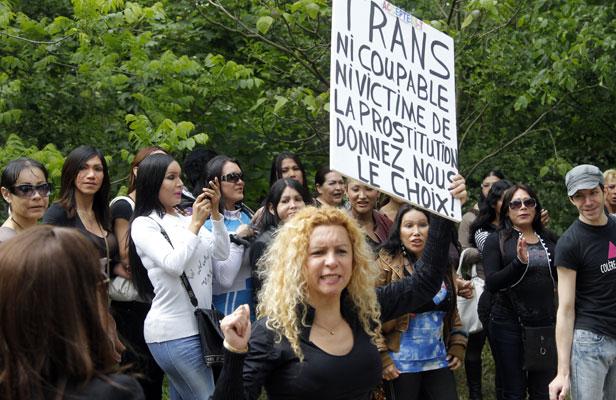At a conference on Sexual Citizenship and Human Rights the other week, I binned the talk I had prepared and instead gave a version of Sex at the Margins: Migration, Labour Markets and the Rescue Industry. It turned out both the other speakers on the panel were to address trafficking, one as a straightforward Rescue-Industry member, and I’m not capable of watching an innocent audience listen to that stuff without speaking up.
 My new talk was called Denial of Consent, because previously at this event consent was mentioned continuously as a key human-rights concept in European sexuality law. How telling, then, that European specialists declaim adolescents’ right to consent to have sex at the same time that other Europeans declaim ever more often that most adult women and trans who sell sex have not consented. In anti-trafficking campaigns the claim is very often that these victims cannot speak/have no voice giving an excuse for others to ‘speak for’ them.
My new talk was called Denial of Consent, because previously at this event consent was mentioned continuously as a key human-rights concept in European sexuality law. How telling, then, that European specialists declaim adolescents’ right to consent to have sex at the same time that other Europeans declaim ever more often that most adult women and trans who sell sex have not consented. In anti-trafficking campaigns the claim is very often that these victims cannot speak/have no voice giving an excuse for others to ‘speak for’ them.
In Prostitution Law and the Death of Whores I focussed on the mechanism by which Rescuers – feminists, social workers, politicians, police – discredit what adult women say about their experiences of selling sex, thus disqualifying them as subjects in a discussion about their own fates. What they say varies widely, of course, but rather than engage in seeking policy that would allow individual experiences to become central and rather than listening with interest to what sexworker activists say and finding migrants to talk to, they claim to Know Better how they should think and feel. The mainstream television series Borgen included a scene in which the non-sexworker experts on a Copenhagen panel discussion of prostitution interrupt and scoff at the sole sexworker participant, demonstrating how well-known the mechanism of disqualification has become (photo above from Season 3, Episode 25). Refusal to believe in the consent of women who sell sex also contradicts widespread anti-rape campaigning that puts consent at the core of sexual relationships.
 The law to be voted in France’s Assemblée today (4 December 2013) is the product of years of process and politicking, not only in France but in certain feminist networks in Europe. In April 2011 I wrote Europe’s anti-prostitution initiatives multiply: EU itself and now France, linking developments to the European Women’s Lobby campaign for A Europe Free from Prostitution. Last month I wrote, with Thierry Schaffauser, about how the testimony of sexworker activists have been deliberately disqualified from consideration by politicians and certain feminists in France. This is accomplished by claiming these activists are a privileged elite selfishly putting their own interests above those victims of sex trafficking said to be ‘voiceless’ and requiring others to speak for them. Alice Schwarzer, currently campaigning against Germany’s law regulating prostitution, referred to them recently as ‘a few cheerful prostitutes’, of no consequence compared to the miserable 95%.
The law to be voted in France’s Assemblée today (4 December 2013) is the product of years of process and politicking, not only in France but in certain feminist networks in Europe. In April 2011 I wrote Europe’s anti-prostitution initiatives multiply: EU itself and now France, linking developments to the European Women’s Lobby campaign for A Europe Free from Prostitution. Last month I wrote, with Thierry Schaffauser, about how the testimony of sexworker activists have been deliberately disqualified from consideration by politicians and certain feminists in France. This is accomplished by claiming these activists are a privileged elite selfishly putting their own interests above those victims of sex trafficking said to be ‘voiceless’ and requiring others to speak for them. Alice Schwarzer, currently campaigning against Germany’s law regulating prostitution, referred to them recently as ‘a few cheerful prostitutes’, of no consequence compared to the miserable 95%.
It’s now 20 years since I first wondered how this refusal to listen operates, at a time when I lived far from Europe amongst very poor women, many of whom were thinking about travelling to Europe. Some already sold sex at home, many were thinking of doing it abroad, others did not want to sell sex but work as live-in maids. This means that my first thoughts and feelings were attached to a specific real-life situation in which I had no axe to grind, no interest one way or the other. In terms of research on women who sell sex I even had what can be called a control group – women of the same cohort who didn’t sell sex. I was unaware a conflict existed within feminism on the topic, I hadn’t read books about prostitution. I was  just as interested in what women said about being maids, and I still am. I’ve commented frequently on how my original research question, before I knew what research was, really, concerned the presumption by middle-class women that they Knew Better than sex workers what they should do with their lives. When I studied for a Master’s and then a doctoral degree my focus was never on migrants but on people wanting to rescue them, and after some six or seven years I felt I had answered my original question in several ways. Read Sex at the Margins for details.
just as interested in what women said about being maids, and I still am. I’ve commented frequently on how my original research question, before I knew what research was, really, concerned the presumption by middle-class women that they Knew Better than sex workers what they should do with their lives. When I studied for a Master’s and then a doctoral degree my focus was never on migrants but on people wanting to rescue them, and after some six or seven years I felt I had answered my original question in several ways. Read Sex at the Margins for details.
I have followed events closely in Europe now for 15 years, living in several different countries and visiting many others, sometimes for extended stays. France is a country I have known since a first school trip from London to Calais, maybe in 1961, and since then I have spent a lot of time there. So i closely watched the action in France’s Assemblée last Friday – not the rhetoric, which I know by heart, but the tones and nuances of speech by the proponents of the law. The auditorium was nearly empty, but all politicking was over; what happened on the floor was not debate but the formal rhetoric of presenting a proposition. Any suggestion from the opposition that the law was sloppily conceived was rebutted with arch-seriousness about how long and carefully proponents had worked on it. The media were accused of missing the point, said to be not penalising clients but protecting women who sell sex.
I do understand what Najat Vallaud-Belkacem, France’s Minister for Women’s Rights, wants to do. I’ve studied in depth what this one kind of feminism wants to achieve, i see how marvellous it sounds – a world without prostitution, a France in which State Feminism takes a daring step towards Gender Equality. Vallaud-Belkacem herself is a very different face for abolitionism from the more embittered and older radical feminists we’ve become used to: Gunilla Eckberg, Melissa Farley, Janice Raymond, Alice Schwarzer and others in every country. She is younger, prettier and was born in a colony, Morocco. French campaigneers have not leant on anti-trafficking rhetoric but on the classic idea that prostitution is a patriarchal institution that must be abolished – the arguments I read when I first started my formal studies in the late 90s. Unfounded numbers of trafficking victims are thrown out, yes, but I read the French effort as being more serious than that. The thing is neither slapdash nor hysterical but part of a sober attempt to change the European panorama, to shift the gaze from small-population Nordic countries never seen as important European players to the continent, to France – to the heart of real Europe. I see this shift as game-changing.
On the other hand, the reason i wrote Sex at the Margins still holds; nothing has improved for sex workers or for people called trafficked or for undocumented migrants in Europe. The anti-trafficking movement has diverted attention and money into everything but benefiting the women pitied in the first place. Campaigners have yet to comprehend how migrants, and a lot of other women, feel about doing high-stigma, risky, better-paying jobs – especially when the other options are practically non-existent. Rescuers’ fundamental project insists on the need to force people into leading lives considered better. It would appear they are incapable of imagining that others are different from themselves, that migrants perceive their options on the basis of their own life experiences and goals. The question is much bigger than Do you like selling sex? rather it is how the range of an individual’s needs, from sleeping patterns to children’s school schedules and the desire for consumer goods may lead them to prefer selling sex to everything else Rescuers can offer. In fact they offer little, which victims and non-victims alike understand.
Few sex workers are attracted by ‘exit strategies’ or ‘diversion programmes’. They hate being low-paid, disparaged, disrespected cleaners, nannies and maids. They don’t want to return to their countries as failed migrants. They don’t want to be poorer again. The sex act may be something they adapt to, learn to enjoy or close their eyes and endure, but if doing it provides more freedom, autonomy, flexibility or hope then it can be preferred, whether people were born in France, China, Nigeria or Brazil. The majority have consented to sell sex, somehow or other, to some degree. Insisting that they leave the milieu when there is so little to offer them is the opposite of kind. In the Rescue Industry protagonists are those who appoint themselves to ‘accompany’ victims out of the life, not those being saved. The consent of adult women is denied en masse.
The French law, apart from the fine of 1500€ for clients arrested the first time, is all about Rescue. The frame is France does not welcome prostitution, meaning prostitution must cease to exist there. It’s estimated at least 80% of sex workers in France moved there from somewhere else, some with the right to remain and look for other jobs. Other migrants are offered 336€ a month for six months if they promise to stop selling sex; since this is far from enough to live on it’s obviously hoped they will leave more quickly, moving to someone else’s country, putting the proposition in the NIMBY tradition – Not in My Back Yard. Street soliciting, outlawed by Sarkozy in 2003 but for many years tolerated or enforced unevenly in different cities, would be permitted again. The law’s backers claim this to be a kind step, but street sex workers say clients will only insist on going to less accessible, more dangerous places to have sex. Besides, local ordinances against street soliciting can be and have been passed at the city level; Lyon is an example.
Logistically the law was informally voted on last Friday. Today is the formal vote. If it passes it is sent to the Sénat, where two scenarios are possible: It passes and goes into effect or it is rejected and sent back to the Assemblée with amendments. In the latter case, the Assemblée vote on a new version that goes back to the Sénat. If the Sénat reject that, a commission paritaire would be named, half from the Sénat, half from the l’Assemblée. The version produced by this commission would then be voted on by the Assemblée, who have the last word. (Thanks to Morgane Merteuil of STRASS for clarifying this process. See their website for other information).
I have loads of links to videos and articles I’ll try to put up soon.
–Laura Agustín, the Naked Anthropologist
http://www.lauraagustin.com/what-does-the-french-prostitutionlaw-mean-denial-of-consent



